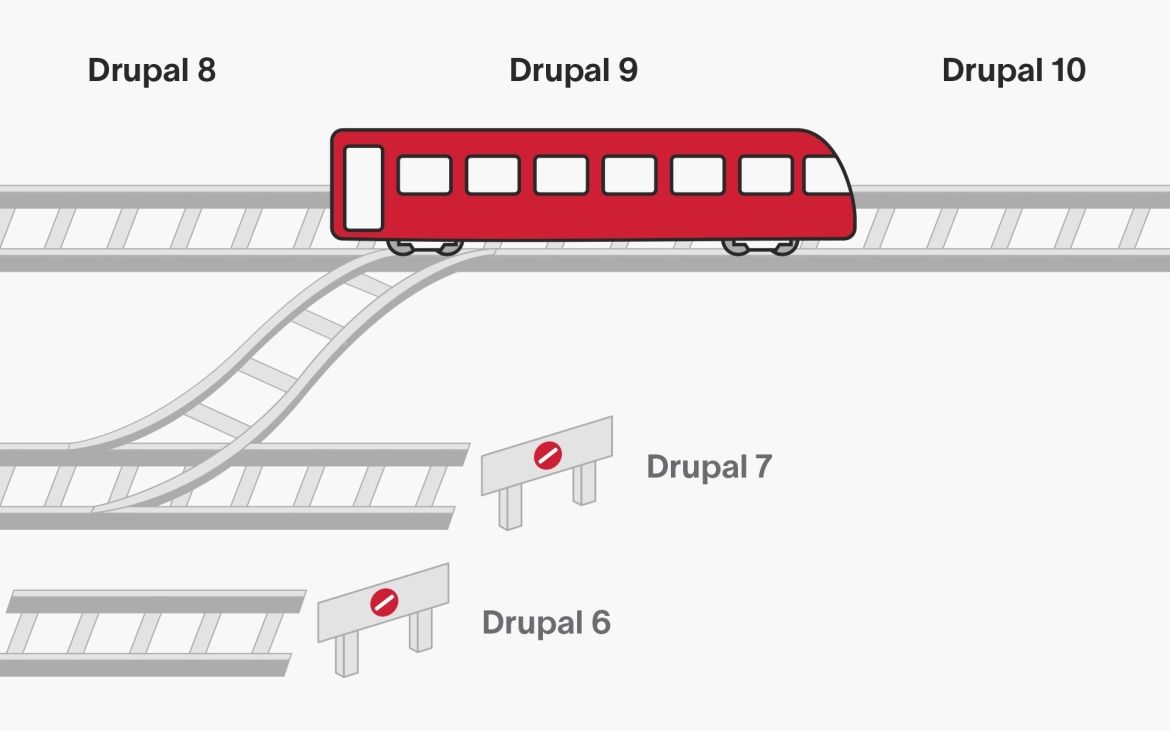It’s the end of the line for Drupal 7. Are you ready?
End of the line for Drupal 7
In November 2023, Drupal 7 will reach its end-of-life (EOL) date, and organizations will need to migrate to the latest and greatest version of the platform. And while the Drupal Association has extended this EOL date before*, we don’t anticipate it happening again. Now is the time to start planning for the move if you haven’t already.
What is EOL? What happens if I don’t upgrade?
You may be asking yourself “What does end-of-life even mean?” and “Well, what happens if I don’t upgrade?”.
After the EOL date, all official support from the Drupal community and Drupal Association will end. This includes security updates, platform enhancements, and upgrades, meaning the time is now to plan your upgrade to the latest version of Drupal.
If you don’t upgrade, your site may no longer function as expected, and you’ll be missing out on newer features and functionalities that may benefit your website users. The bigger risk, however, comes from a security standpoint. Not only will the site not be secure, but it may be flagged by third-party scans prompting IT concerns in your organization.
Some limited security fixes will continue through November 2025, via the Drupal 7 Extended Vendor Support program.
Don't be scared
Drupal was initially released in 2001, having 9 major upgrade releases since that time. Each release to date has come with significant time and effort for organizations. Drupal 7 to 10 will be no different. The good news is that moving off of Drupal 7 should be the last of these major upgrades with the upgrade path now being much more simplified. The Drupal Association uses the train analogy to describe the new upgrade path: new versions required moving to a different train track altogether, but now major upgrades are like stations along the same track.
Not only is the upgrade path easier once you get off Drupal 7, but there are also so many tools to help with upgrades along the way.
Symfony
A big reason for the new found ease of updates is that since Drupal 8 the Symfony framework has been adopted as a standard for the basis of much of Drupal’s PHP back-end.
Composer
Drupal 8 and up also use Composer for managing core, modules, and other dependencies.
Upgrade status
For Drupal 7, the upgrade status module can find available versions of installed contrib modules, recommend replacements and indicate those that have no known version or alternative for Drupal 9+.
Once you’re on Drupal 9+ this contrib module is made to help identify any issues between future core updates and your current version of core, hosting environment, and contrib module versions.
Rector
Rector automates fixes for deprecations in your codebase for upgrades and was a huge time saver for our development teams in our past Drupal 8 to Drupal 9 upgrades.
Features/Benefits in Drupal 10 for those on Drupal 7
Existing Drupal 7 users should be ready to experience some exciting changes. Drupal 10 brings an evolved content management system that better meets users' needs and technological enhancements.
A few things to look forward to include:
- Easier to maintain
- Standardized on a more broadly accepted PHP framework (Symfony)
- More functionality in the core base install (Views being the biggest/most obvious example)
- Layout builder, core support for component-based design
- API first architecture
- More suited to multi-channel publishing, headless/decoupled, Create Once Publish Everywhere (COPE)
- Use modern front-end technologies
- Moving away from Drupal’s JQuery dependency
- New included themes with modern features (mobile menus, responsive design) and improved UI/UX in core
- Olivero is the new front-end theme, replacing Seven
- Claro, the new default admin theme (replacing Bartik) provides a much improved experience for content editors and site administrators.
- TWIG templates
- More secure than PHP templates in Drupal 7
- Larger community use outside of Drupal
- That means better documentation and support when getting started
- That means better documentation and support when getting started
- More functionalities are included to help make powerful templates
Upgrading to Drupal 10
A key aspect of upgrading your Drupal 7 site to Drupal 10 is going to be determining the contrib and custom modules you’ll need for your sites. Many common contrib solutions for Drupal 7 now appear in core, or have some similar functionality in core.
Here are some common modules you might be using on Drupal 7, and how they’ve been replaced with the newest version of Drupal.
Feature Module
- In Drupal 7 we used this to help eliminate the need for manually recreating configuration changes in the admin when deploying between environments
- Features allowed you to save configuration settings to the code base and import them after code deployments to capture configuration changes. It was an important module for Drupal 7 since it removed some aspects of human error and the need for manually copying/pasting or clicking configuration changes.
- This has mostly been replaced by core configuration management, but you can still use it to make modules for reusable functionality/features of a site for use in a distribution or productized solution. A key improvement for that use case is that now the modules it generates don’t require Features itself to be installed. Modules created by Features can be independent of it and installed just like any other modules vs. via the Features interface in Drupal 7.
Field Collections Module
- Doesn't exist in Drupal 10
- Migration of fields to components like Paragraphs, or to entities in the Layout builder
Panels
- Use core the layout builder module
- Pages will need to be rebuilt accordingly
Files / Media
- Media and Media Library modules in core replace the need for the contrib Media module for reusable files and file management
Time is running out!
Don’t wait until you reach the end of the line to upgrade. With the end-of-life date of November 2023 coming quickly, it is critical you start planning your upgrade to Drupal 10 today. With so many things to consider, consulting a Drupal implementation expert like Northern can ensure you have a seamless experience upgrading your site. From user experience research and planning through to the execution of award-winning content management systems, we can help you get on the right track.
*Source: https://www.drupal.org/about/core/policies/core-release-cycles/schedule
Ready to chat about your project?
Stay informed, sign up for our newsletter.


